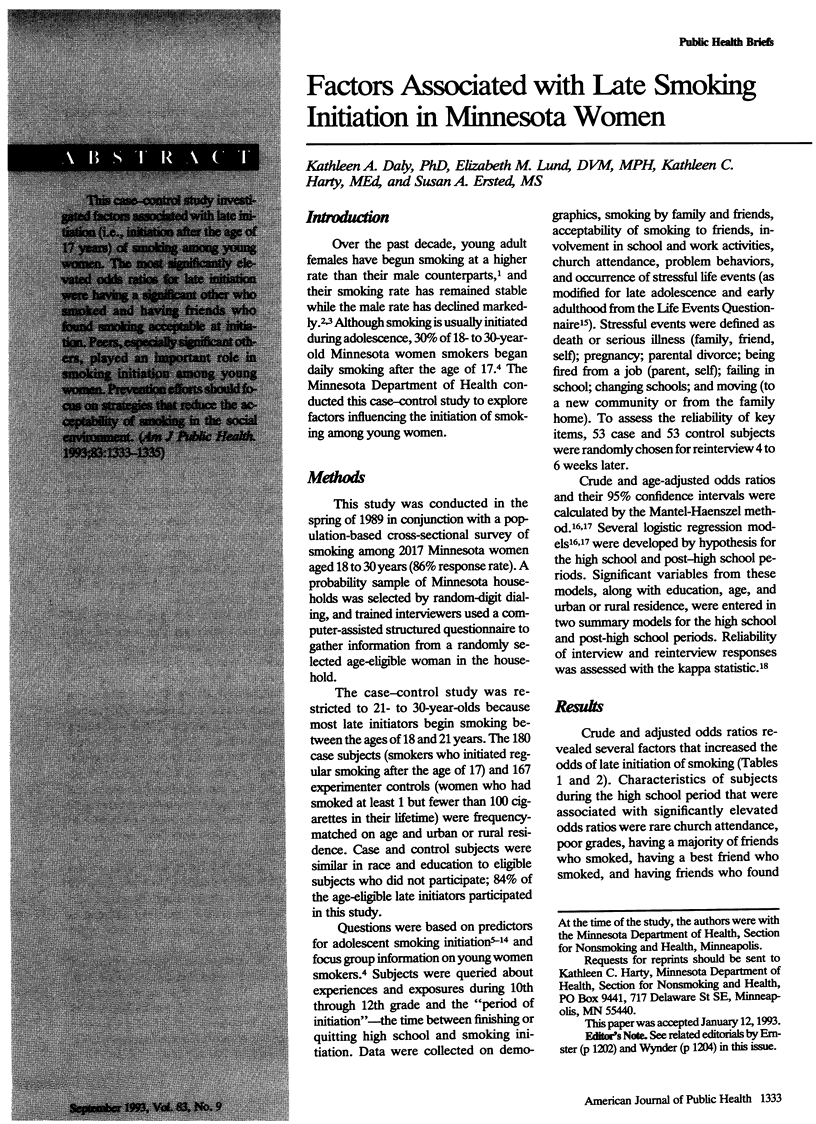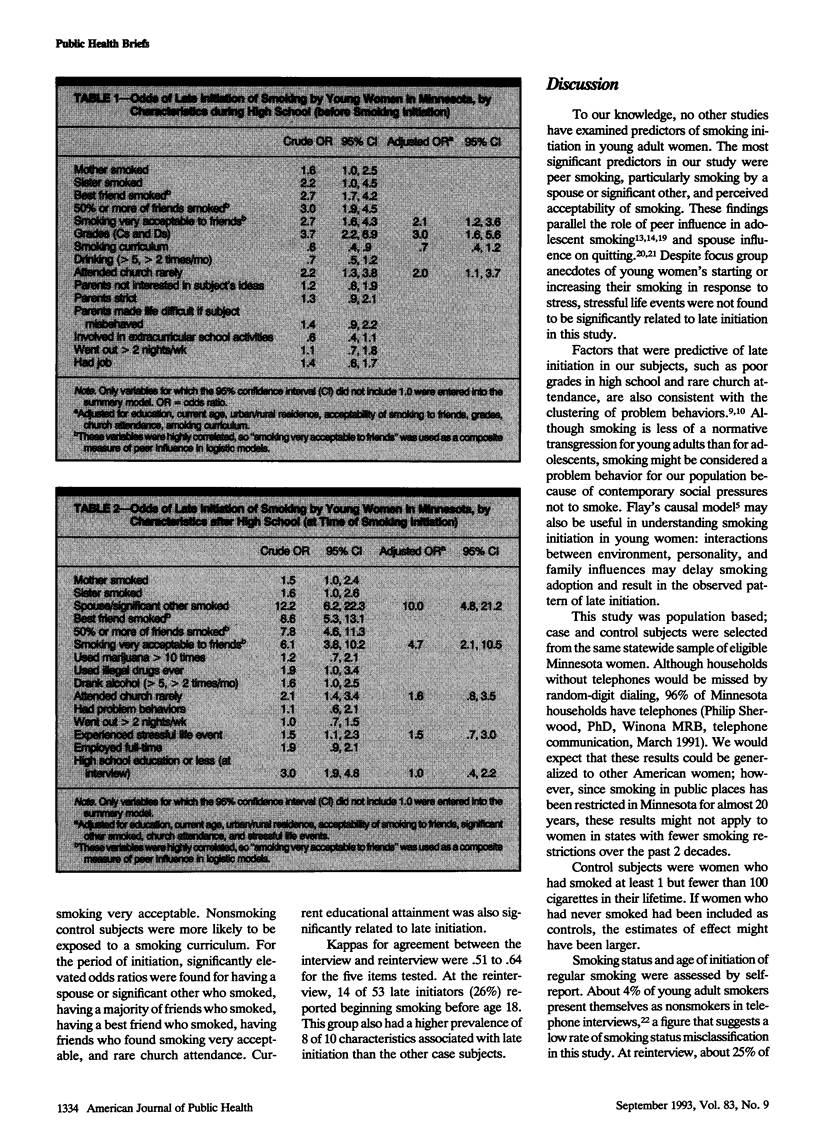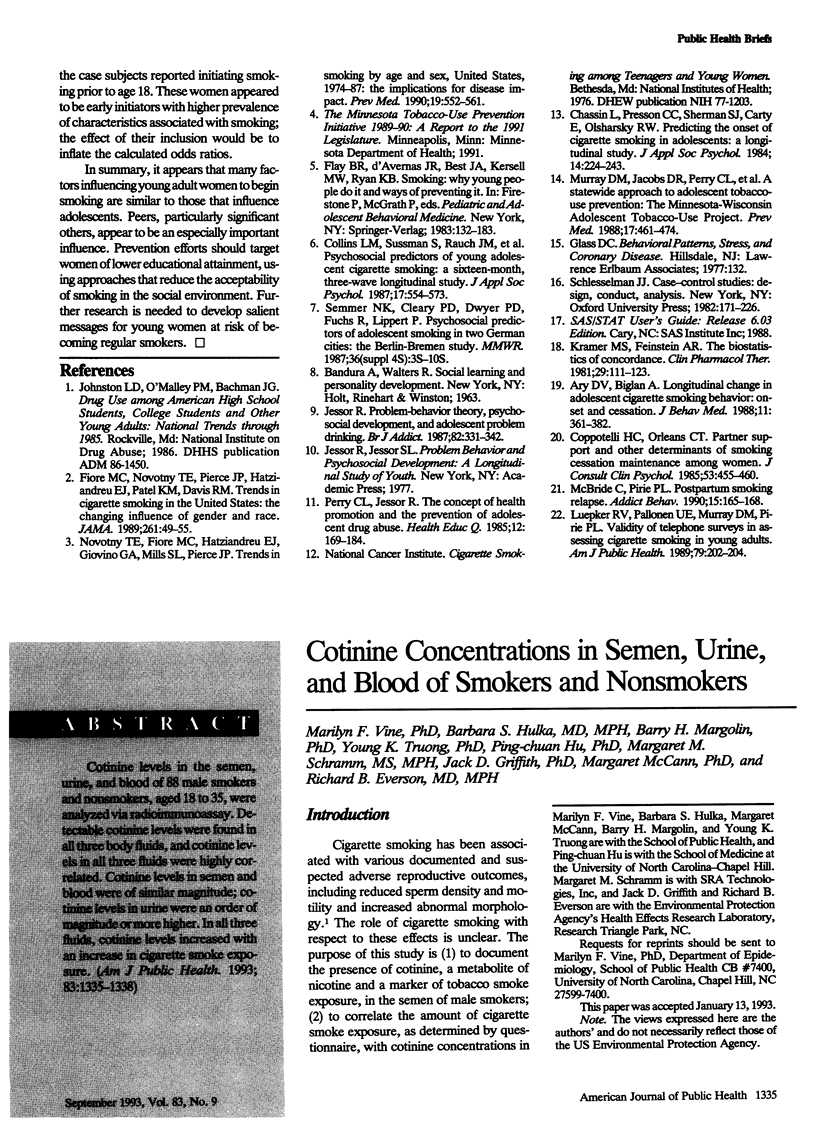Abstract
This case-control study investigated factors associated with late initiation (i.e., initiation after the age of 17 years) of smoking among young women. The most significantly elevated odds ratios for late initiation were having a significant other who smoked and having friends who found smoking acceptable at initiation. Peers, especially significant others, played an important role in smoking initiation among young women. Prevention efforts should focus on strategies that reduce the acceptability of smoking in the social environment.
Full text
PDF


Selected References
These references are in PubMed. This may not be the complete list of references from this article.
- Ary D. V., Biglan A. Longitudinal changes in adolescent cigarette smoking behavior: onset and cessation. J Behav Med. 1988 Aug;11(4):361–382. doi: 10.1007/BF00844936. [DOI] [PubMed] [Google Scholar]
- Coppotelli H. C., Orleans C. T. Partner support and other determinants of smoking cessation maintenance among women. J Consult Clin Psychol. 1985 Aug;53(4):455–460. doi: 10.1037//0022-006x.53.4.455. [DOI] [PubMed] [Google Scholar]
- Fiore M. C., Novotny T. E., Pierce J. P., Hatziandreu E. J., Patel K. M., Davis R. M. Trends in cigarette smoking in the United States. The changing influence of gender and race. JAMA. 1989 Jan 6;261(1):49–55. [PubMed] [Google Scholar]
- Jessor R. Problem-behavior theory, psychosocial development, and adolescent problem drinking. Br J Addict. 1987 Apr;82(4):331–342. doi: 10.1111/j.1360-0443.1987.tb01490.x. [DOI] [PubMed] [Google Scholar]
- Kramer M. S., Feinstein A. R. Clinical biostatistics. LIV. The biostatistics of concordance. Clin Pharmacol Ther. 1981 Jan;29(1):111–123. doi: 10.1038/clpt.1981.18. [DOI] [PubMed] [Google Scholar]
- Luepker R. V., Pallonen U. E., Murray D. M., Pirie P. L. Validity of telephone surveys in assessing cigarette smoking in young adults. Am J Public Health. 1989 Feb;79(2):202–204. doi: 10.2105/ajph.79.2.202. [DOI] [PMC free article] [PubMed] [Google Scholar]
- McBride C. M., Pirie P. L. Postpartum smoking relapse. Addict Behav. 1990;15(2):165–168. doi: 10.1016/0306-4603(90)90020-x. [DOI] [PubMed] [Google Scholar]
- Murray D. M., Jacobs D. R., Perry C. L., Pallonen U., Harty K. C., Griffin G., Moen M. E., Hanson G. A statewide approach to adolescent tobacco-use prevention: the Minnesota-Wisconsin Adolescent Tobacco-Use Research Project. Prev Med. 1988 Jul;17(4):461–474. doi: 10.1016/0091-7435(88)90045-x. [DOI] [PubMed] [Google Scholar]
- Novotny T. E., Fiore M. C., Hatziandreu E. J., Giovino G. A., Mills S. L., Pierce J. P. Trends in smoking by age and sex, United States, 1974-1987: the implications for disease impact. Prev Med. 1990 Sep;19(5):552–561. doi: 10.1016/0091-7435(90)90053-m. [DOI] [PubMed] [Google Scholar]
- Perry C. L., Jessor R. The concept of health promotion and the prevention of adolescent drug abuse. Health Educ Q. 1985 Summer;12(2):169–184. doi: 10.1177/109019818501200204. [DOI] [PubMed] [Google Scholar]
- Semmer N. K., Cleary P. D., Dwyer J. H., Fuchs R., Lippert P., Centers for Disease Control (CDC) Psychosocial predictors of adolescent smoking in two German cities: the Berlin-Bremen Study. MMWR Suppl. 1987 Sep 4;36(4):3S–10S. [PubMed] [Google Scholar]


